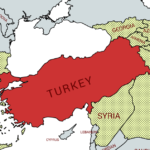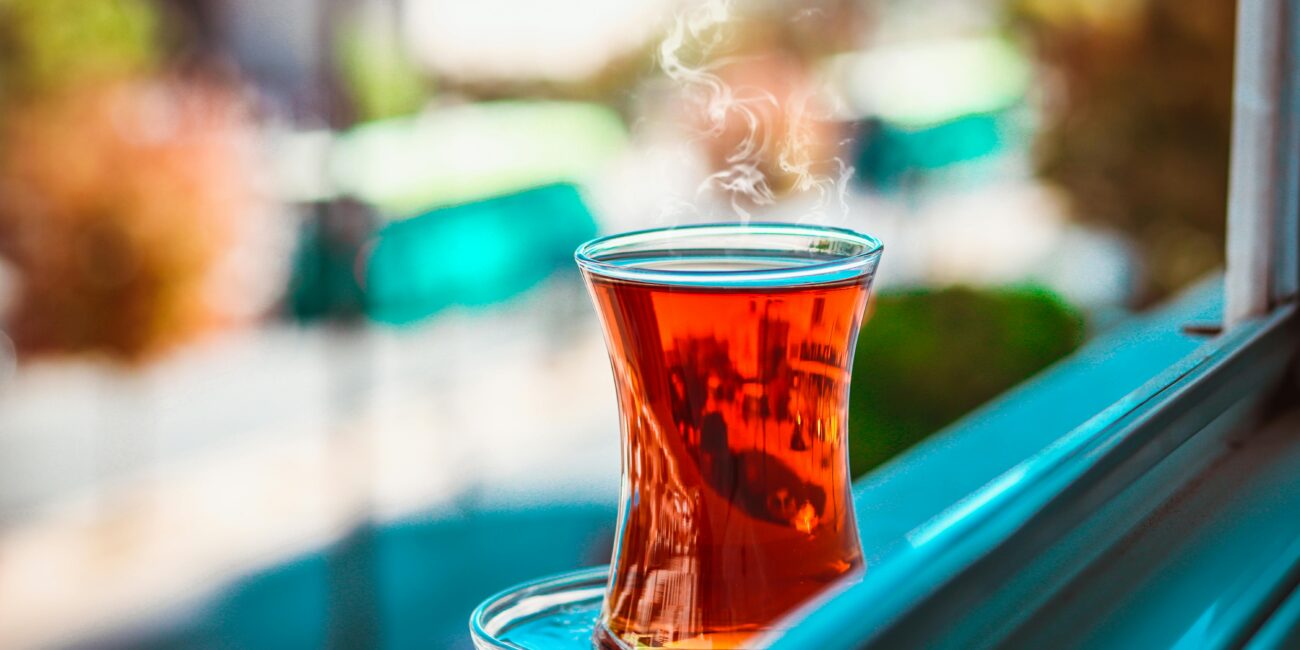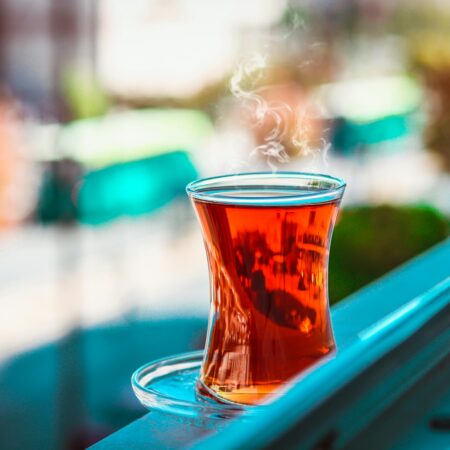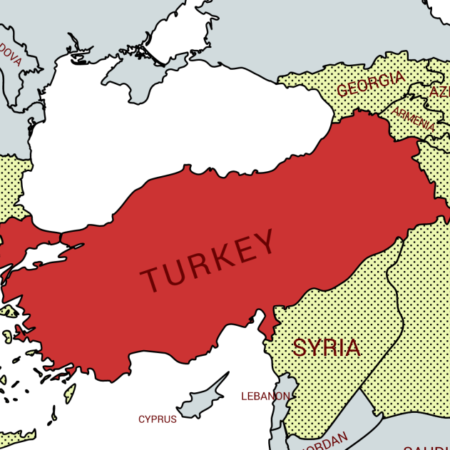Turkish tea, or çay, is more than just a beverage in Türkiye—it is an inseparable part of the nation’s social, cultural, and even political fabric. From the bustling tea gardens along the Bosphorus to the humble village homes in Anatolia, tea has found a way into every corner of daily life. In this article, we will explore the roots of Turkish tea culture, how it evolved over centuries, its social significance today, and why tea continues to serve as a symbol of hospitality, identity, and unity in modern Türkiye.
The Historical Roots of Turkish Tea
Though often associated with Türkiye, tea is not native to Anatolia. Coffee reigned supreme in the Ottoman Empire for centuries until geopolitical shifts and trade restrictions after World War I pushed Turkish society to adopt tea as a new national drink. Mustafa Kemal Atatürk, the founder of the Turkish Republic, encouraged tea consumption as a cost-effective and accessible alternative to coffee. In the 1930s, tea plantations were established in the Black Sea region, particularly around Rize, which remains the heart of Turkish tea production today.
The Turkish government played a significant role in promoting tea consumption, even launching state-supported tea factories and cooperatives. By the mid-20th century, tea had become a defining element of Turkish identity.
How Turkish Tea is Made and Served
Turkish tea is distinct in both preparation and presentation. It’s brewed using a two-tiered teapot called a çaydanlık. The bottom kettle holds boiling water, while the top contains tea leaves. This setup allows people to control the strength of their tea by mixing strong tea (from the upper pot) with hot water (from the lower pot), resulting in either açık (light) or demli (strong) tea.
Tea is always served in small, tulip-shaped glasses (ince belli) that allow drinkers to appreciate its rich color and aroma. The glasses are often set on small saucers with two sugar cubes placed beside them—though it’s considered improper to add milk or lemon to Turkish tea.
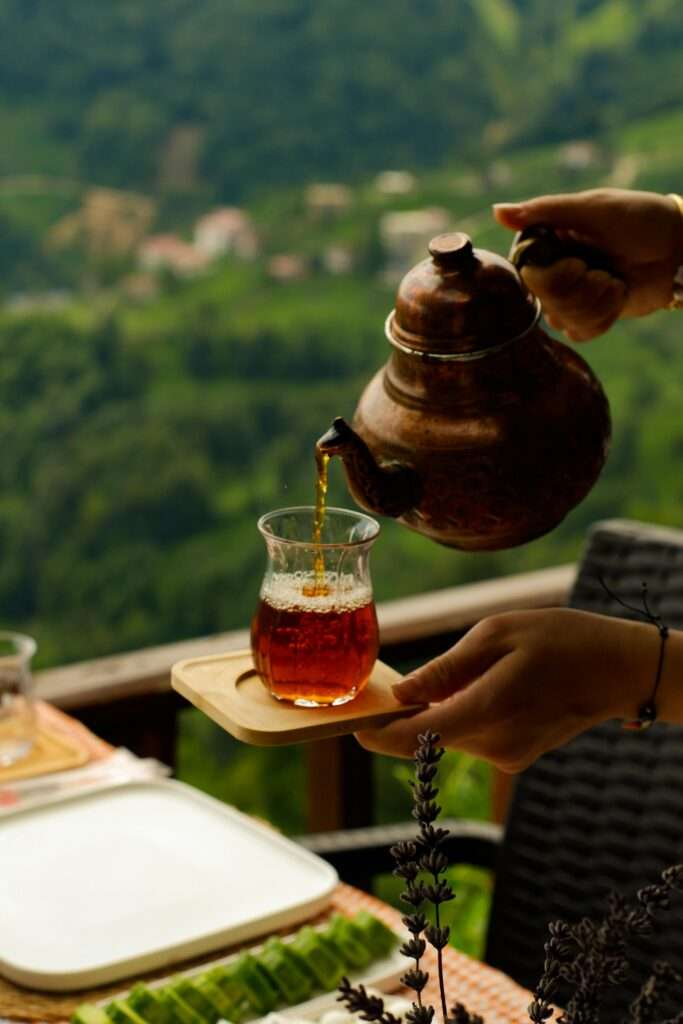
Tea as a Symbol of Hospitality
In Türkiye, offering tea is a near-sacred social ritual. Whether in a home, a shop, or a government office, tea is a gesture of goodwill and welcome. Declining tea is rare and sometimes considered impolite, particularly in more traditional or rural areas. From casual family gatherings to formal business meetings, tea serves as an icebreaker, a sign of respect, and a way to build trust.
One of the most telling images of Turkish hospitality is the small boy or man weaving through crowded streets balancing a tray of tea glasses, delivering them from local tea houses to nearby shopkeepers. This everyday scene is emblematic of the communal nature of Turkish society.
Tea Houses: The Social Heart of the Community
Tea houses, or çay bahçesi (tea gardens) and kıraathane (traditional tea houses), are central to Turkish social life. These places are where men gather to chat, play backgammon, discuss politics, and relax after a long day of work. In rural areas, tea houses often serve as informal town halls where local issues are debated and communal decisions are made.
In cities like Istanbul, İzmir, and Ankara, tea gardens offer scenic views and a relaxing atmosphere, attracting young people, families, and tourists. Despite Türkiye’s rapid modernization, the tea house remains a timeless institution.
The Role of Tea in Turkish Daily Life
Drinking tea is not limited to special occasions—it punctuates daily routines. Most Turks start their day with a glass of strong tea and continue drinking it throughout the day. Office workers, students, and artisans alike take frequent breaks to enjoy tea and socialize.
In Turkish weddings, funerals, circumcisions, or even protests, tea is served. It bridges all social classes and regions, reinforcing the idea that despite political or economic differences, Turks share a collective cultural practice.
Women and Tea Culture
While many traditional tea houses are male-dominated spaces, women have carved out their own tea culture. Women’s tea gatherings (gün) are common across Türkiye, especially in conservative neighborhoods. These events serve as social support networks and are venues for sharing recipes, gossip, and advice.
In urban areas, women increasingly enjoy tea in co-ed cafes and tea houses, reflecting changing social norms. Turkish tea has therefore become a subtle but powerful symbol of evolving gender roles in modern Türkiye.
Political and Economic Dimensions of Tea
Tea is also deeply embedded in Türkiye’s political and economic life. Politicians frequently appear in public sipping tea, sending a message of connection to the people. Serving tea during campaign rallies or neighborhood visits is a tactic to humanize leaders and promote trust.
Economically, tea is a major agricultural product. The Rize region alone supports hundreds of thousands of farmers and tea workers. Turkish tea is also exported to more than 100 countries, including Germany, the UK, and Russia. However, domestic consumption still accounts for the majority—Türkiye ranks among the top tea-consuming nations per capita in the world.
Turkish Tea vs. Other Global Tea Cultures
Unlike British tea with milk or Chinese green tea ceremonies, Turkish tea stands out for its intensity, social aspect, and national symbolism. It’s not about the variety or health benefits—it’s about connection. The ritual of brewing, pouring, and sharing tea reflects Turkish values of community and hospitality.
This is perhaps why tea has outlasted many other cultural trends, remaining steadfast through wars, economic crises, and generational change.
The Influence of Tea on Turkish Art and Literature
Tea has also inspired poets, writers, and musicians. In Turkish poetry, tea is often a metaphor for melancholy, companionship, or nostalgia. Authors like Orhan Veli and Nazım Hikmet referenced tea as a symbol of the ordinary, yet profound beauty in everyday life.
Modern Turkish cinema frequently features scenes where characters share tea during pivotal conversations, underlining its role as a silent companion to emotional moments.
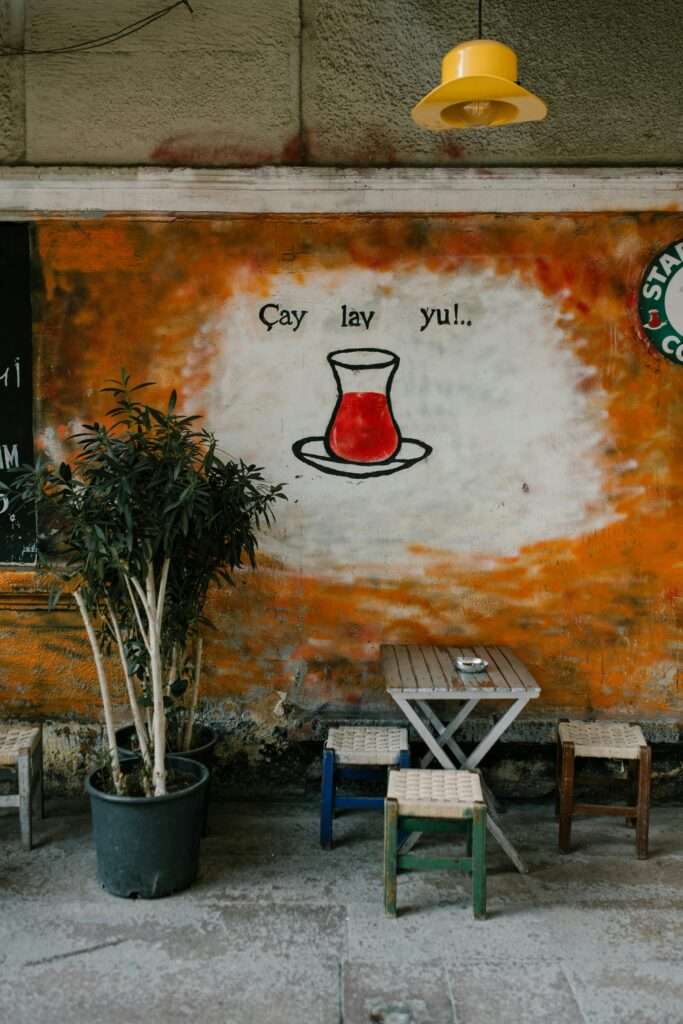
Tourism and the Tea Experience
For travelers, experiencing Turkish tea is an essential cultural activity. Whether sipping tea with locals in a Grand Bazaar stall, watching the sunset in a Bosphorus-side café, or being offered tea in a carpet shop, tourists often find that these small moments leave the biggest impressions.
Many tours now include visits to tea gardens or even tea plantations in Rize, offering a deeper look into Türkiye’s tea heritage.
Conclusion: More Than Just a Drink
Turkish tea is not just a beverage; it’s a ritual, a cultural expression, and a tool of social cohesion. It connects generations, bridges social divides, and reflects the hospitality that defines Turkish identity. In a world where technology often isolates us, Turkish tea culture remains a powerful reminder of the value of connection, warmth, and shared moments.


